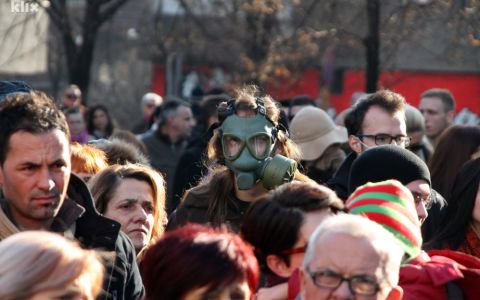Czech Minister of Environment Libor Ambrozek responded to the appeal of association ARNIKA and of the international ecological organization Worldwide Fund for Nature (WWF) and agreed with analysis of his blood sample. His own example documented the influence of environmental pollution of human health. Today the minister published results of the blood analysis.
The appeal which WWF carried out towards ministers with the request to have their blood tested for the presence of hazardous chemicals, is related to the preparation of new European system of chemicals´ treatment known as REACH (1). „The new system (REACH) shall secure that the risks for human health as well as environmental impacts will be as low as possible. Usage of the most hazardous substances should be permitted only until a certain date, and that would stimulate seeking for less risky alternatives,“ minister Ambrozek explained.
His blood had been tested for the presence of five groups of hazardous persistent organic chemicals, for instance organochlorinated pesticides (such as DDT (2) or hexachlorbenzen), polychlorinated biphenyls (PCBs) (3), brominated flame retardants (PBDE and others), phthalates and polyfluorinated chemicals.
The results showed that minister´s blood is contaminated mainly by PCBs and DDT. This fact documents higher appearance of these chemicals in former Czechoslovakia. DDT was a pesticide used mainly in agricultural regions, i.e. also in the South Moravia which Ambrozek comes from. PCBs had been used in higher extent in South Moravian chemical facilities. Another chemical found in minister´s blood was the one used as flame retardant (PBDE) which is present in carpets, curtains, decorative textiles and in computer casing (shields).
“Unlike the PCBs and DDT, these chemicals have been still produced and their consumption is growing all over the world,“ said Jindřich Petrlík, head of ARNIKA´s campaign Toxic Free Future. On contrary, low concentrations in Ambrozek´s blood related to phthalates.
The appeal made by WWF has met a positive response among another 13 ministers and deputy ministers from 12 EU countries (4). Altogether 55 of 103 observed chemicals were found in their blood. „All ministers are contaminated by industrial chemicals, health impacts of which have not been completely analyzed,“ Karl Wagner, head of WWF´s campaign DetoX commented on the results. However, all these chemicals are connected by a fact that they have ability to accumulate in blood and tissues and that organism is not able to degrade them. Many of these chemicals are proven to cause hormonal disruptions. „REACH aims to prevent these risks in a future. But it can happen only in case that it will be approved in enough strict form,“ Petrlík added.
„As for the health impacts, we have sufficient information only about a tiny part of ten thousands of currently used chemicals. And REACH should change this. ARNIKA develops efforts to push forward requirements of European NGOs which demand REACH that would be really effective,“ said Petr Hrdina from ARNIKA.
European Commissioner for environment, Margot Wallström, passed similar test last year. Her blood had been tested for the presence of 77 toxic chemicals and the results confirmed the presence of 28 of them. „Within a few generations, thousands of chemical substances unknown by our grandfathers have accumulated in our bodies. None of us knows what exactly is in our organism and which effects he/she can expect from it,“ Wallström said about the sad results of her blood tests.
Other information:
http://www.arnika.org
https://wwf.panda.org/wwf_news/?14132/EU-Ministers-give-blood-for-chemical-check-up
https://european-union.europa.eu/institutions-law-budget/institutions-and-bodies/institutions-and-bodies-profiles/echa_cs
Notes:
(1) – New European chemical policy (REACH), submitted by the European Commission last October, unifies rules related to chemicals which are already on the market, and those still in phase of development. It introduces the system of registration of all chemicals produced in quantities over 1 tune per year. Part of the chemicals will have to be evaluated from the point of view of its impacts according to the produced quantity or a degree of danger, and in case it is found dangerous it must get approval for usage. REACH shall correct current situation when there is no data about health and environmental impacts of more than 90% of chemicals used in the E.U.
(2) Use of DDT was banned in Czechoslovakia in 1973.
(3) PCBs
(4) List of ministers and deputy ministers who passed the test:
Ministers of environment Libor Ambrozek (Cezch Republic), Jan Erik Enestam (Finland), Serge Lepeltier (France), Alun Michael (Great Britain), László Miklós (Slovakia), Christina Narbón (Spain), Miklós Persányi (Hungary), Hans Christian Schmidt (Denmark, he was in the ministerial chair when the test had been made) and Lena Sommestad (Sweden), deputy environment ministers Olavi Tammemäe (Estonia) and Roberto Tortoli (Italy) and ministers of health Constantina Akkelidou (Cyprus), Mihaly Kokeny (Hungary) and Juozos Olexas (Lithuania).
Ministry of Environment of the Czech Republic
Vršovická 65, 100 10 Praha 10
Karolína Šůlová – spokeswoman
phone: 267 122 944 begin_of_the_skype_highlighting 267 122 944 end_of_the_skype_highlighting, 724 102 406
fax: 267 311 496
This email address is being protected from spambots. You need JavaScript enabled to view it., https://www.mzp.cz/
Association ARNIKA – campaign Toxic Free Future
Chlumova 17, 130 00 Praha 3, phone+fax: 222 781 471,
Marek Jehlička - spokesman
phone: 606 727 942
This email address is being protected from spambots. You need JavaScript enabled to view it., https://arnika.org/en/
Press release of the Ministry of Environment and association ARNIKA






